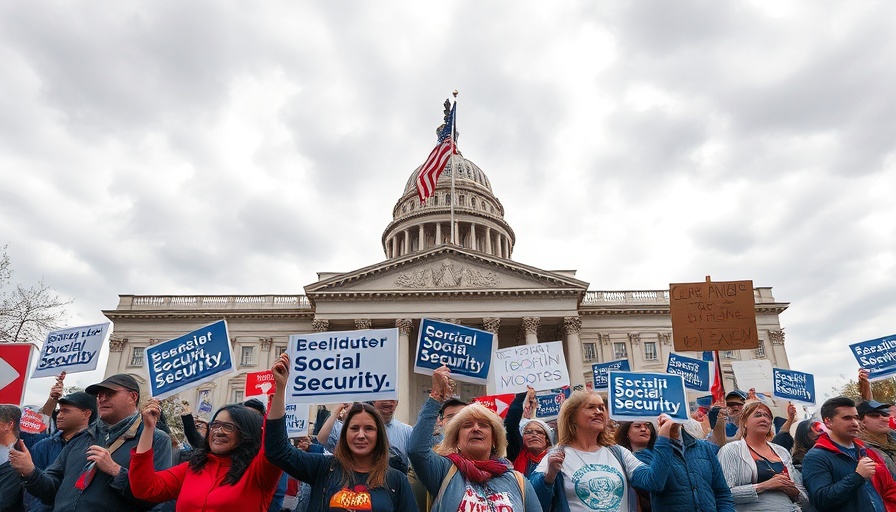
Understanding the Current Crisis at the Social Security Administration
Recent events surrounding the Social Security Administration (SSA) have raised significant concerns regarding the future of America's vital social safety net. Prominent lawmakers, led by Senator Elizabeth Warren, have urged the SSA to halt its plans to reclassify certain employees, a move they argue would undermine job security and impact millions of Americans relying on Social Security benefits. At the heart of this issue is a proposal to designate certain SSA roles as 'policy-influencing,' dramatically altering the employment status of these workers from civil servants to at-will employees who can be fired more easily.
The implications of this move are profound: as SSA faces staff reductions due to cost-cutting measures, the reclassification could exacerbate an already precarious situation by enabling firings that threaten the agency's core functions. Currently, over 73 million Americans depend on Social Security for their monthly benefits, and these proposed changes are causing alarm amongst beneficiaries and their families.
Why This Issue Matters to Americans Today
The conversation around employee reclassification is more than a bureaucratic issue; it strikes at the heart of societal trust in government programs meant to protect the most vulnerable. As the SSA previously managed to assist millions of Americans through economic downturns, the looming changes add layers of uncertainty for seniors and low-income families who rely on timely benefit disbursements. Recent reports indicate that SSA staff members are already feeling a palpable sense of fear and anxiety regarding their employment status, with insiders describing an environment of 'chaos' and 'confusion.'
Significant Historical Context: The Evolution of Social Security
Social Security has been a cornerstone of American social policy since its inception in 1935. Designed to offer financial assistance to the elderly and disabled, it evolved as a response to the Great Depression. Since those early days, the program has safeguarded the economic futures of generations. As the workforce shifted and economic landscapes evolved, the SSA adapted its policies to meet new challenges. However, today's proposed changes are reminiscent of past funding debates and restructurings that risk compromising the administration's ability to fulfill its mission.
Counterarguments: The Push for 'Bureaucratic' Efficiency
While concerns regarding the reclassification are prevalent, there exists an opposing viewpoint advocating for a leaner government structure. Supporters argue that eliminating what they deem “unnecessary bureaucracy” can lead to more efficient management of Social Security programs. The SSA’s acting commissioner has claimed that such changes are essential for a modern workforce capable of delivering services more effectively, especially under financial constraints imposed by ongoing budget cuts.
The Future of Social Security: What’s Next?
As the debate continues, analysts and policymakers are pondering the potential long-term effects of these changes. Could this redefine how social services operate, potentially impacting future generations? The very structure of social security could be at risk if these shifts lead to reduced staffing and expertise. Observers stress that maintaining a strong and stable workforce is crucial for seamless service delivery. Fears of delays in processing applications and claims are becoming a prominent concern as beneficiaries and employees alike await clarity in SSA operations under the new administration.
Practical Implications for Affected Workers
For the SSA employees caught in the crossfire of political maneuvering, the implications are dire. Reports highlight an increasing sense of vulnerability among staff who are unsure of their job security. Conversations with current and former SSA staff reveal deep-seated fears about the impact of job cuts and the effect of losing experienced employees on the agency’s ability to serve the public effectively. Awareness of moral and ethical responsibilities in providing these essential services is paramount, and the potential for widespread layoffs could undermine public faith in these programs.
Local vs. Global Perspectives on Employment Changes
This situation at the SSA is not unique to the United States. Across the globe, social programs are strained by economic pressures, leading many countries to explore similar restructuring measures. As various governments grapple with budget cuts and restructuring efforts, the delicate balance between efficiency and essential services for their citizens is tested. Drawing on examples from these international adjustments provides valuable lessons on the long-term ramifications of such policies. The local concerns resonate deeply as Americans observe and assess the global landscape of social security reforms.
 Add Row
Add Row  Add
Add 




Write A Comment